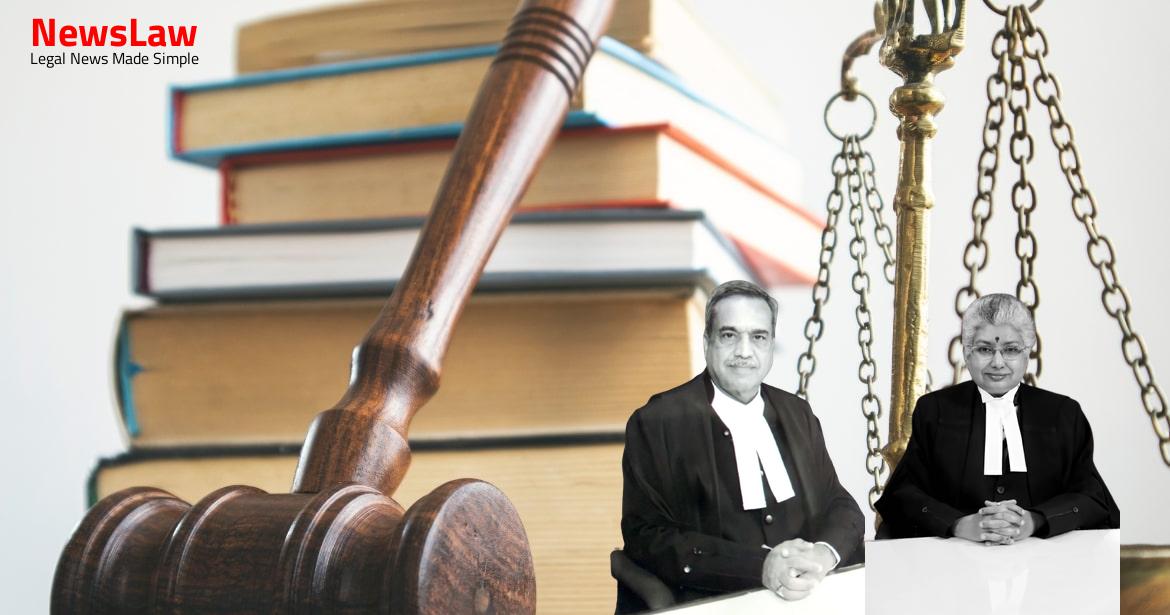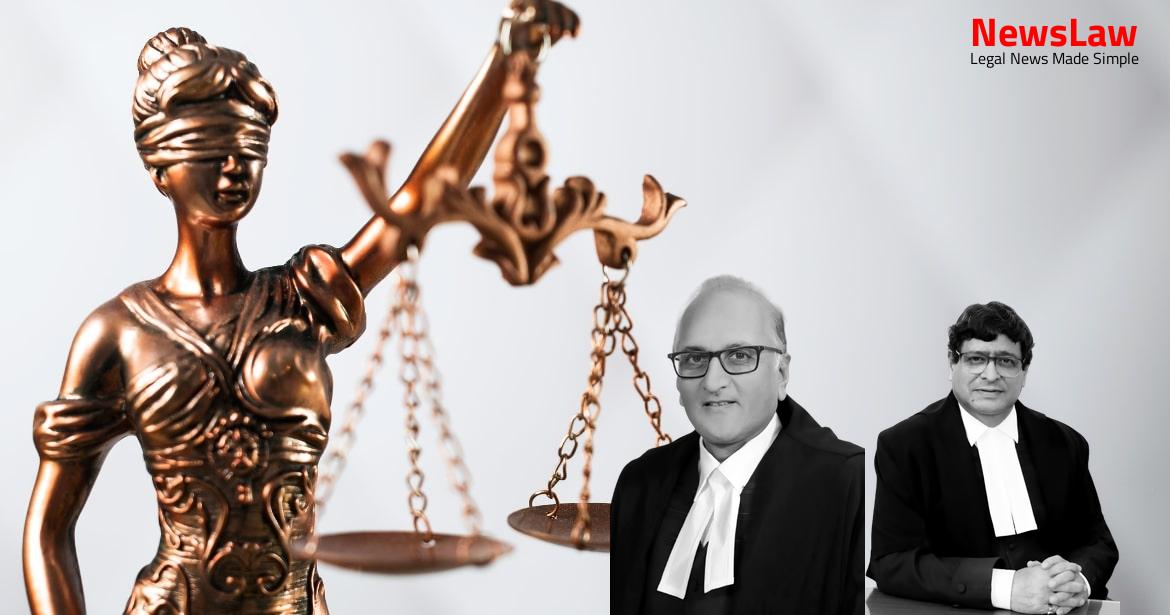The court’s examination of employee representation rights in disciplinary inquiries delves into the intricate balance between procedural fairness and organizational regulations. Analyzing the legal framework governing defense representatives sheds light on the nuanced considerations at play in workplace disciplinary proceedings. This summary outlines the court’s legal analysis on employee representation, providing insight into the delicate balance between employee rights and organizational protocols.
Facts
- The Bank preferred appeal before the Division Bench of the High Court after being aggrieved by the judgment and order passed by the learned Single Judge.
- The Division Bench of the High Court dismissed the appeal, stating that the circular dated 31.1.2014 and Regulation 8.2 did not prohibit the utilization of the services of an ex-employee of the Bank.
- The Division Bench upheld the decision of the Single Judge based on the above reasoning.
- Original writ petitioner requested to be represented by a defense representative (DR) in disciplinary proceedings.
- Bank denied the request citing regulations and guidelines.
- Request for legal practitioner as DR was declined by Disciplinary Authority.
- Multiple requests to engage a legal practitioner or retired officer were turned down.
- Enquiry Officer also declined the request to be represented by a legal practitioner.
- Chargesheet served in accordance with Regulation, 2010.
- Consent letter submitted for engagement of a DR during inquiry proceedings.
- Written reply submitted to the chargesheet by the original writ petitioner.
- Bank opposed the writ petition.
Also Read: Ruling on Circumstantial Evidence in Murder Case
Issue
- Whether respondent employee is entitled to avail the services of an ex-employee of the Bank as his DR in the departmental proceedings?
- This is the key issue for consideration by the Court.
- The central question is the right of the respondent employee to choose a specific person as his Defence Representative.
Also Read: Challenging Legal Presumptions in Negotiable Instrument Cases
Arguments
- Regulation 44 restricts legal practitioners to be DR without prior permission
- Handbook provisions restrict the appointment of retired officials as DRs
- High Court erred in allowing outsiders in disciplinary inquiry
- Right to representation in inquiries is limited by Statute, Service Rules, and Regulations
- Service condition regulations do not allow outside defense representatives
- Direction by the High Court creates an anomalous situation
- High Court did not consider Regulation 8.2 of the Handbook Procedure
- Provisions of Handbook Procedure are binding on all employees
- Challenge to Regulation 8 of the Handbook Procedure was not made by the original writ petitioner
- Appellant bank is aggrieved by the High Court’s decision to allow representation through retired officers
- Judgment of Allahabad High Court affirmed and SLP dismissed.
- No specific bar in service regulation for engaging retired employee as defense representative.
- Regulation 44 considered, no error by High Court.
- Similar case in Allahabad High Court ruled denial without specific bar not justified.
Also Read: Legal Analysis Critique in High Court’s Quashing Order
Analysis
- The High Court analyzed the regulations and handbook procedures regarding representation in departmental inquiries.
- The regulations do not have an absolute bar on engaging a lawyer, but specific restrictions on legal practitioners are outlined.
- The Handbook Procedure approved by the Bank’s Board of Directors mandates representation through serving officials or employees from the Bank.
- The Bank justifies not permitting ex-employees as defense representatives due to concerns of confidentiality, potential delay tactics, and decorum issues.
- The High Court’s decision to allow representation by an ex-employee was based on Regulation 44 but did not consider the Handbook Procedure.
- The employee does not have an absolute right to choose their defense representative, with exceptions for severe and complex cases.
- The Handbook Procedure is seen as supplementary and must be considered in conjunction with Regulation 44.
- The employee cannot demand representation through an agent of their choice as an absolute right.
- There is no conflict between Regulation 44 and allowing ex-employees to be defense representatives as the regulations are silent on this aspect.
- In the case of Indian Overseas Bank (supra), it was observed that there is no absolute right to representation by somebody else in domestic enquiries unless the rules or regulations and standing orders allow for it.
- The delinquent’s right to representation in the case before the Court was regulated by the Standing Orders, which permitted representation through a clerk, workman, officer, staff-member, or a member of the Union, upon authorization by the State Government.
- Refusal to allow representation by a Union, unless specified in the Standing Orders, does not invalidate the proceedings.
- The rule of natural justice concerning the delinquent’s right of hearing does not extend to a right to be represented through counsel or an agent. Representation by an outsider, even a union representative, is subject to the discretion of the Management.
- In the Dunlop Rubber Company case, it was held that an employee does not have an inherent right to be represented by another person in disciplinary proceedings unless provided for in the Service Rules.
- Reasonable opportunity should be given to delinquent employees to meet the charges against them during domestic enquiries.
- In Cipla Ltd. and Ors (supra), it was held that the right to be represented in departmental proceedings can be restricted and regulated by statutes, Service Rules, or Standing Orders applicable to the employee.
- The objective of such restrictions is to ensure the timely completion of the domestic enquiry and the competence of the representative defending the delinquent.
- Denying the opportunity to be represented by a chosen representative is not a violation of principles of natural justice.
- Decision of the Allahabad High Court in the case of Rakesh Singh is not applicable as Handbook Procedure was not in force at that time
- Handbook Procedure was adopted by the Board of Directors in a meeting held on 15.3.2019
- The High Court erred in allowing the delinquent officer to be represented by an ex-employee in the departmental enquiry
- The view of the learned Single Judge confirmed by the Division Bench is unsustainable
Decision
- Present appeal allowed
- Impugned judgment and order quashed and set aside
- Respondent delinquent officer not permitted representation by ex-employee of the Bank in departmental proceedings
Case Title: THE RAJASTHAN MARUDHARA GRAMIN BANK (RMGB) Vs. RAMESH CHANDRA MEENA (2022 INSC 10)
Case Number: C.A. No.-007451-007451 / 2021



